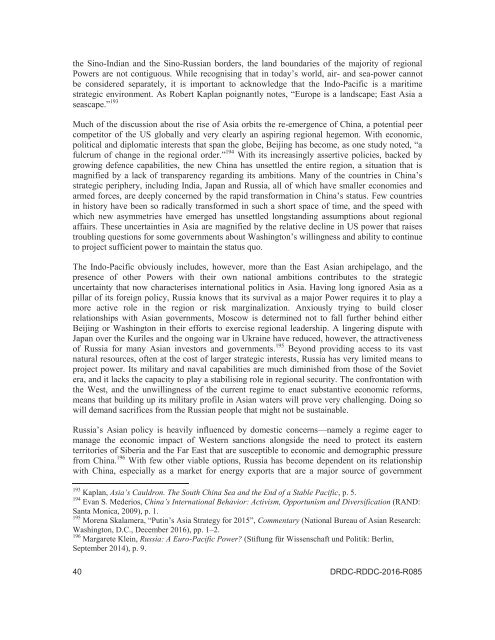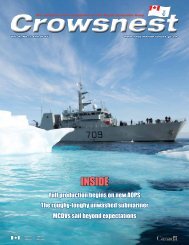You also want an ePaper? Increase the reach of your titles
YUMPU automatically turns print PDFs into web optimized ePapers that Google loves.
<strong>the</strong> Sino-Indian <strong>and</strong> <strong>the</strong> Sino-Russian borders, <strong>the</strong> l<strong>and</strong> boundaries <strong>of</strong> <strong>the</strong> majority <strong>of</strong> regional<br />
<strong>Power</strong>s are not contiguous. While recognising that in today’s world, air- <strong>and</strong> sea-power cannot<br />
be considered separately, it is important to acknowledge that <strong>the</strong> Indo-Pacific is a maritime<br />
strategic environment. As Robert Kaplan poignantly notes, “Europe is a l<strong>and</strong>scape; East Asia a<br />
seascape.” 193<br />
Much <strong>of</strong> <strong>the</strong> discussion about <strong>the</strong> rise <strong>of</strong> Asia orbits <strong>the</strong> re-emergence <strong>of</strong> China, a potential peer<br />
competitor <strong>of</strong> <strong>the</strong> US globally <strong>and</strong> very clearly an aspiring regional hegemon. With economic,<br />
political <strong>and</strong> diplomatic interests that span <strong>the</strong> globe, Beijing has become, as one study noted, “a<br />
fulcrum <strong>of</strong> change in <strong>the</strong> regional order.” 194 With its increasingly assertive policies, backed by<br />
growing defence capabilities, <strong>the</strong> new China has unsettled <strong>the</strong> entire region, a situation that is<br />
magnified by a lack <strong>of</strong> transparency regarding its ambitions. Many <strong>of</strong> <strong>the</strong> countries in China’s<br />
strategic periphery, including India, Japan <strong>and</strong> Russia, all <strong>of</strong> which have smaller economies <strong>and</strong><br />
armed forces, are deeply concerned by <strong>the</strong> rapid transformation in China’s status. Few countries<br />
in history have been so radically transformed in such a short space <strong>of</strong> time, <strong>and</strong> <strong>the</strong> speed with<br />
which new asymmetries have emerged has unsettled longst<strong>and</strong>ing assumptions about regional<br />
affairs. <strong>The</strong>se uncertainties in Asia are magnified by <strong>the</strong> relative decline in US power that raises<br />
troubling questions for some governments about Washington’s willingness <strong>and</strong> ability to continue<br />
to project sufficient power to maintain <strong>the</strong> status quo.<br />
<strong>The</strong> Indo-Pacific obviously includes, however, more than <strong>the</strong> East Asian archipelago, <strong>and</strong> <strong>the</strong><br />
presence <strong>of</strong> o<strong>the</strong>r <strong>Power</strong>s with <strong>the</strong>ir own national ambitions contributes to <strong>the</strong> strategic<br />
uncertainty that now characterises international politics in Asia. Having long ignored Asia as a<br />
pillar <strong>of</strong> its foreign policy, Russia knows that its survival as a major <strong>Power</strong> requires it to play a<br />
more active role in <strong>the</strong> region or risk marginalization. Anxiously trying to build closer<br />
relationships with Asian governments, Moscow is determined not to fall fur<strong>the</strong>r behind ei<strong>the</strong>r<br />
Beijing or Washington in <strong>the</strong>ir efforts to exercise regional leadership. A lingering dispute with<br />
Japan over <strong>the</strong> Kuriles <strong>and</strong> <strong>the</strong> ongoing war in Ukraine have reduced, however, <strong>the</strong> attractiveness<br />
<strong>of</strong> Russia for many Asian investors <strong>and</strong> governments. 195 Beyond providing access to its vast<br />
natural resources, <strong>of</strong>ten at <strong>the</strong> cost <strong>of</strong> larger strategic interests, Russia has very limited means to<br />
project power. Its military <strong>and</strong> naval capabilities are much diminished from those <strong>of</strong> <strong>the</strong> Soviet<br />
era, <strong>and</strong> it lacks <strong>the</strong> capacity to play a stabilising role in regional security. <strong>The</strong> confrontation with<br />
<strong>the</strong> West, <strong>and</strong> <strong>the</strong> unwillingness <strong>of</strong> <strong>the</strong> current regime to enact substantive economic reforms,<br />
means that building up its military pr<strong>of</strong>ile in Asian waters will prove very challenging. Doing so<br />
will dem<strong>and</strong> sacrifices from <strong>the</strong> Russian people that might not be sustainable.<br />
Russia’s Asian policy is heavily influenced by domestic concerns—namely a regime eager to<br />
manage <strong>the</strong> economic impact <strong>of</strong> Western sanctions alongside <strong>the</strong> need to protect its eastern<br />
territories <strong>of</strong> Siberia <strong>and</strong> <strong>the</strong> Far East that are susceptible to economic <strong>and</strong> demographic pressure<br />
from China. 196 With few o<strong>the</strong>r viable options, Russia has become dependent on its relationship<br />
with China, especially as a market for energy exports that are a major source <strong>of</strong> government<br />
193 Kaplan, Asia’s Cauldron. <strong>The</strong> South China Sea <strong>and</strong> <strong>the</strong> End <strong>of</strong> a Stable Pacific, p. 5.<br />
194 Evan S. Mederios, China’s International Behavior: Activism, Opportunism <strong>and</strong> Diversification (RAND:<br />
Santa Monica, 2009), p. 1.<br />
195 Morena Skalamera, “Putin’s Asia Strategy for 2015”, Commentary (National Bureau <strong>of</strong> Asian Research:<br />
Washington, D.C., December 2016), pp. 1–2.<br />
196 Margarete Klein, Russia: A Euro-Pacific <strong>Power</strong>? (Stiftung für Wissenschaft und Politik: Berlin,<br />
September 2014), p. 9.<br />
40 DRDC-RDDC-2016-R085




